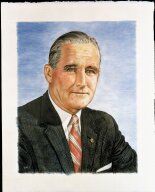|
 Printer-Friendly Version Printer-Friendly Version
 |
1911-1974
"When you're head of a union, you've got to be a
sociologist, marriage counselor, father confessor, psychiatrist, economist,
legal expert, all wrapped into one. You must have the desire to help people
help themselves." — Joseph A. Beirne |
A proud Irish-American, Joseph A. Beirne was a true Horatio Alger figure
rising from working-class roots to his position as President of the
Communications Workers of American (CWA) and counselor to Presidents and Popes.
Born in Jersey City, New Jersey, on February 16, 1911, Beirne dropped in and
out of school, but eventually attended St. Peter's College in his hometown
before crossing the Hudson River to enroll at NYU. During that time, in 1928,
he worked at the Western Electric Company in Jersey City.
In 1933, the National Industrial Recovery Act's (NIRA) Section 7(a)
stated that workers had the right to organize. American industry tried to avoid
direct unionization by creating "employee associations," referred to as
"company unions." Beirne, the president of his own Western Electric New York
Distribution Association, helped his and other company unions join the
fledgling National Federation of Telephone Workers (NFTW) in 1938. The 9th
National Caucus of that body, meeting in Cleveland in 1943, elected him union
president at the age of 32.
During World War II, Beirne served on many government boards,
commissions, and advisory councils. He was elected to the Fairview (NJ) City
Council between 1939-1945. As president of the NFTW union, he fended off raids
from rival AFL unions, communist insurgents, and jurisdictional competitors.
All the while, however, he preached that the labor movement must practice
solidarity and predicted the AFL and CIO would someday merge; a fact
consummated on December 5, 1955. He negotiated the first national agreement
with AT&T in 1946 and worked tirelessly for industry-wide pattern
bargaining in major industries. In 1974 the CWA became the first major union to
achieve that goal. While still President of NFTW, Beirne led organizing drives
into the anti-union South and organized several companies including giant Bell
South.
In 1947, the delegates to the 1st convention of the CWA elected him
president. Throughout his career, Beirne worked toward the goal of establishing
"one big union" of all electrical and communications workers. That goal has not
been attained, but in 2000 the International Union of Electrical Workers merged
with CWA.
During the Beirne years, the CWA was one of the most progressive unions
in the nation, seeking equal pay and benefits, in particular, for the union's
large constituency of women workers. He championed international worker rights
and was a founding influence on the American Institute for Free Labor
Development (AIFLD). In addition to union work, Joseph Beirne took great pride
in social activism. He was the first labor leader to head United Community
Funds, now the United Way. He was also on the board of the Corporation for
Public Broadcasting. And, true to his Irish-Catholic roots, he was an active
member in the Knights of Columbus.
On Labor Day, 1974, just months after negotiating the pattern setting
agreement with the telephone industry, Joe Beirne died. His legacy was carried
on by CWA presidents, Glenn Watts and Morton Bahr.
| |
|



